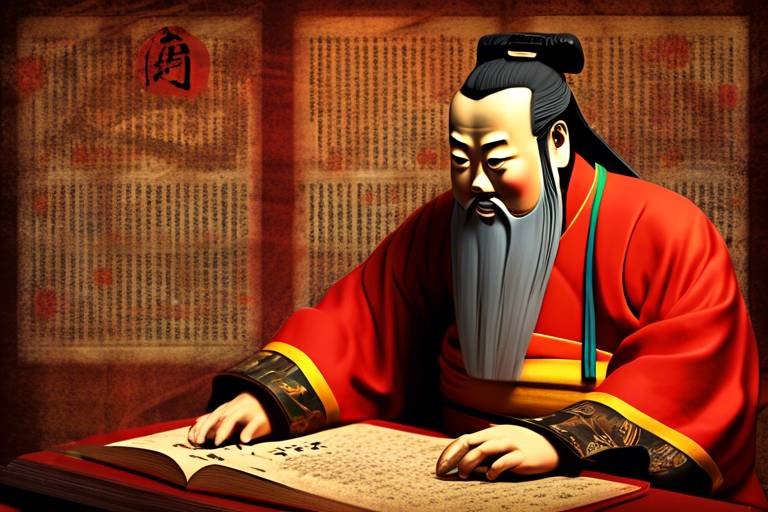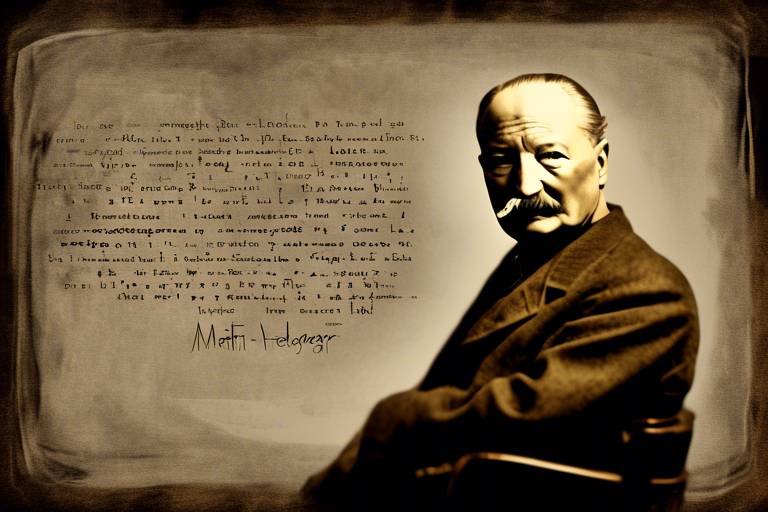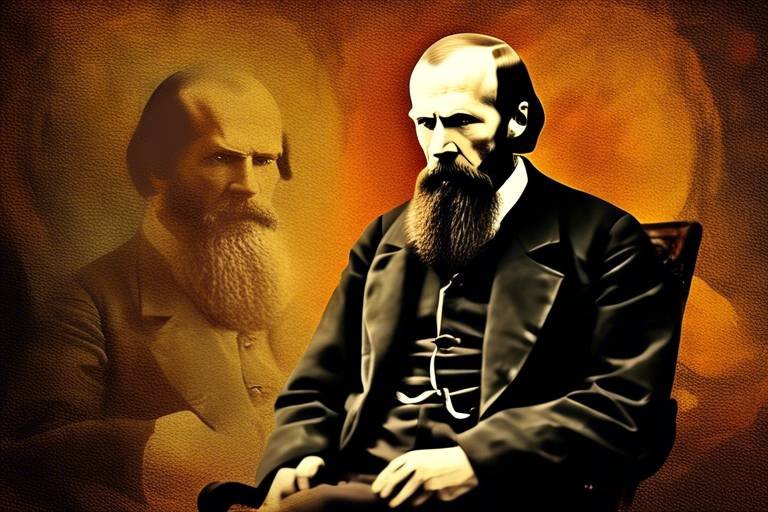Feminism in Philosophy - Highlighting Simone de Beauvoir
Feminism, as a philosophical movement, has roots that intertwine with various intellectual traditions, but few figures have been as pivotal as Simone de Beauvoir. Born in 1908 in Paris, de Beauvoir not only challenged the status quo of her time but also laid the groundwork for modern feminist thought. Her contributions extend beyond mere theory; they resonate deeply with the lived experiences of women across generations. In this article, we will explore de Beauvoir's life, her key works, and the profound impact she has had on contemporary feminist philosophy and gender studies.
Simone de Beauvoir's journey began in a bourgeois family, where she was raised with the expectations of a traditional woman. However, her upbringing did not confine her spirit. She pursued her education at the prestigious Sorbonne, where she studied philosophy, mathematics, and literature. These academic pursuits would later fuel her critical analysis of gender roles and societal norms. The experiences she encountered during her formative years—such as the constraints placed on women and the existential crises faced by individuals—shaped her philosophical outlook and feminist beliefs.
One of de Beauvoir's most influential works is The Second Sex, published in 1949. This groundbreaking text is often hailed as a foundational work in feminist literature, dissecting the construction of womanhood and the societal forces that perpetuate gender inequality. De Beauvoir famously asserts that "one is not born, but rather becomes, a woman," emphasizing the role of socialization in shaping gender identity. Her exploration of women's oppression through the lens of existentialism not only critiques the patriarchal structures of society but also calls for women to reclaim their agency and assert their identities.
At the heart of de Beauvoir's philosophy lies the intersection of existentialism and feminism. She adeptly applied existentialist principles to the experiences of women, arguing that women must transcend the limitations imposed upon them by society. This perspective aligns with the existentialist belief in the importance of individual freedom and choice. By asserting that women have the right to define themselves, de Beauvoir challenges the traditional narratives that confine women to passive roles. Her work invites readers to reflect on their own existence and the choices they make, highlighting the power of personal agency in the fight for gender equality.
One of de Beauvoir's key contributions to feminist philosophy is her analysis of the concept of 'Otherness'. She posits that women have historically been defined as the "Other" in relation to men, who are seen as the default or the norm. This dynamic creates a hierarchy that perpetuates oppression and marginalization. By understanding this framework, we can begin to unravel the complexities of gender relations and recognize the systemic forces that sustain inequality. De Beauvoir's insights into Otherness challenge us to rethink our perceptions of gender and the social constructs that govern our lives.
De Beauvoir's emphasis on freedom and choice is another cornerstone of her philosophy. She argues that true liberation for women lies in their ability to make choices that reflect their authentic selves, free from societal constraints. This notion of choice is not merely about having options; it is about taking responsibility for those choices and understanding their implications. By advocating for women's agency, de Beauvoir empowers individuals to challenge traditional gender roles and assert their right to live as they choose.
In her work The Ethics of Ambiguity, de Beauvoir explores the moral responsibilities of individuals in a world filled with uncertainty. She argues that embracing ambiguity is essential for authentic living, as it allows individuals to navigate the complexities of existence. This ethical framework emphasizes the importance of recognizing the interconnectedness of our choices and the impact they have on others. De Beauvoir's insights into ethics encourage a reflective approach to decision-making, urging us to consider the broader implications of our actions in the context of social justice and equality.
Simone de Beauvoir's ideas have left an indelible mark on feminist movements and theorists. Her work has shaped discussions around gender equality, identity, and liberation, inspiring countless activists and scholars. The feminist waves that followed her publication of The Second Sex drew heavily on her insights, using them as a foundation to challenge the status quo. De Beauvoir's legacy is evident in the ongoing dialogues surrounding women's rights, as her philosophy continues to resonate with contemporary feminist discourse.
Today, de Beauvoir's philosophy remains relevant, as issues of gender inequality persist in various forms. From workplace discrimination to reproductive rights, her ideas provide a framework for understanding and addressing these challenges. Modern feminists often reference de Beauvoir's work to articulate their struggles and aspirations, demonstrating the enduring power of her thought. Her emphasis on agency and choice continues to inspire new generations to advocate for a more just and equitable society.
Despite her significant contributions, de Beauvoir's work has not been without critique. Some feminist scholars have raised concerns about her perspectives on race, sexuality, and class, arguing that her focus on the experiences of white, heterosexual women may overlook the complexities faced by marginalized groups. These debates highlight the importance of intersectionality in feminist discourse, urging a more inclusive understanding of women's experiences. Engaging with these critiques allows us to expand de Beauvoir's legacy and ensure that her insights remain relevant in the fight for social justice.
- What is Simone de Beauvoir best known for?
Simone de Beauvoir is best known for her seminal work, The Second Sex, which explores the construction of gender and the oppression of women.
- How did de Beauvoir influence feminist philosophy?
De Beauvoir's ideas on agency, choice, and the concept of 'Otherness' have profoundly shaped feminist thought, inspiring movements for gender equality.
- What are some critiques of de Beauvoir's work?
Critiques often focus on her perspectives regarding race, sexuality, and class, suggesting that her work may not fully encompass the diverse experiences of all women.

The Life of Simone de Beauvoir
Simone de Beauvoir was born on January 9, 1908, in Paris, France, to a bourgeois family that had a significant influence on her upbringing. Her father, a successful lawyer, and her mother, a highly educated woman, instilled in her a love for literature and philosophy from a young age. Growing up in a society that often limited women's roles, de Beauvoir quickly became aware of the disparities between the expectations placed on men and women. This awareness would later fuel her passion for feminist philosophy.
De Beauvoir attended the prestigious Lycée Louis-le-Grand, where she excelled academically. She went on to study at the Sorbonne, where she earned a degree in philosophy. It was during her time at university that she met Jean-Paul Sartre, a fellow philosopher, who would become both her lifelong partner and intellectual companion. Their relationship, characterized by its unconventional nature, allowed de Beauvoir to explore her ideas about freedom, choice, and the essence of existence.
Throughout her life, de Beauvoir was influenced by various intellectual movements, including existentialism—a philosophy that emphasizes individual existence, freedom, and choice. This philosophical framework deeply shaped her views on women's liberation. Her experiences during World War II, particularly her involvement in the French Resistance, further solidified her commitment to social justice and equality. The war exposed her to the harsh realities of oppression and the importance of fighting for one’s rights.
De Beauvoir's life was not just about her intellectual pursuits; she was also a prolific writer and an outspoken advocate for women's rights. Her groundbreaking work, The Second Sex, published in 1949, challenged the traditional notions of femininity and laid the groundwork for modern feminist thought. In this work, she famously declared, "One is not born, but rather becomes, a woman," highlighting the social constructs that define gender roles.
Throughout her life, de Beauvoir faced numerous challenges, including societal backlash against her ideas and the complexities of her relationship with Sartre, which often drew public scrutiny. However, her determination to advocate for women's rights and her philosophical insights left an indelible mark on both feminist theory and existential philosophy. Her legacy continues to inspire generations of feminists and philosophers alike.
- What were the main contributions of Simone de Beauvoir to feminism?
De Beauvoir's key contributions include her exploration of women's oppression, the concept of 'the Other,' and her emphasis on freedom and choice in women's lives. - How did de Beauvoir's relationship with Sartre influence her work?
Their partnership allowed de Beauvoir to engage deeply with existentialist ideas and helped shape her views on gender and identity. - What is the significance of The Second Sex?
This book is considered a foundational text in feminist philosophy, as it critiques the historical treatment of women and argues for their liberation.

Key Works and Ideas
Simone de Beauvoir's contributions to feminist philosophy are monumental, and her key works resonate with profound insights into the human condition, gender dynamics, and the essence of freedom. Perhaps her most famous work, The Second Sex, published in 1949, is a foundational text that challenges the traditional notions of femininity and the societal roles assigned to women. In this groundbreaking book, de Beauvoir famously asserts that "One is not born, but rather becomes, a woman," which encapsulates her belief that gender is a social construct rather than an innate quality. This assertion has sparked countless discussions and debates in feminist theory, making it a cornerstone of gender studies.
In The Second Sex, de Beauvoir explores the historical and cultural contexts that have led to women's oppression. She meticulously analyzes how women have been relegated to the status of the "Other," a concept she elaborates on throughout her work. This notion of 'Otherness' plays a crucial role in understanding the dynamics of power and subjugation in gender relations. De Beauvoir's analysis of women's experiences through the lens of existentialism allows her to argue that women must reclaim their identity and agency, moving away from the definitions imposed upon them by a patriarchal society.
Another significant work by de Beauvoir is The Ethics of Ambiguity, where she delves into the complexities of human existence and the moral responsibilities that come with it. In this text, she posits that life is inherently ambiguous and that individuals must navigate this ambiguity to find meaning and purpose. This ethical framework encourages a recognition of the freedom and choices available to individuals, emphasizing that with freedom comes the responsibility to act authentically and ethically. Through this lens, de Beauvoir not only addresses the existential dilemmas faced by women but also challenges the broader societal structures that limit their choices.
To further understand de Beauvoir's impact on feminist thought, it's essential to highlight some of her key ideas:
- Existential Freedom: De Beauvoir argues that true freedom involves the ability to make choices that reflect one's authentic self, free from societal constraints.
- The Importance of Choice: She emphasizes that women must have the agency to make choices about their own lives, which is crucial for achieving gender equality.
- Critique of Traditional Gender Roles: De Beauvoir challenges the traditional roles assigned to women, advocating for a redefinition of femininity that allows for a broader range of experiences and identities.
In summary, Simone de Beauvoir's key works and ideas not only laid the groundwork for feminist philosophy but also continue to inspire contemporary discussions about gender, identity, and freedom. Her ability to intertwine existentialist thought with feminist theory has opened new avenues for understanding the complexities of women's lives and the societal structures that shape them. As we navigate the ongoing conversations around gender equality, de Beauvoir's insights remain as relevant as ever, urging us to question and redefine the narratives surrounding femininity and women's rights.
1. What is the main argument of The Second Sex?
The main argument of The Second Sex is that gender is a social construct and that women have historically been defined as the "Other," which has led to their oppression. De Beauvoir advocates for women to reclaim their identity and agency.
2. How does de Beauvoir's existentialism relate to feminism?
De Beauvoir's existentialism emphasizes the importance of freedom, choice, and authenticity, which are crucial for understanding women's experiences and identities. She argues that women must navigate their own paths and make choices that reflect their true selves.
3. What is the significance of the concept of 'Otherness' in de Beauvoir's work?
The concept of 'Otherness' is significant because it highlights how women have been marginalized and defined in relation to men. This framework allows for a deeper understanding of the power dynamics at play in gender relations and the need for women to assert their own identities.
4. How did de Beauvoir influence contemporary feminist thought?
De Beauvoir's ideas continue to resonate in modern feminist discourse, shaping discussions around gender equality, identity, and liberation. Her work encourages ongoing reflection on the societal structures that affect women today.

The Second Sex,
This article explores the contributions of Simone de Beauvoir to feminist philosophy, examining her key ideas and their impact on contemporary feminist thought and gender studies.
Simone de Beauvoir was born on January 9, 1908, in Paris, France, into a middle-class family. Her upbringing was quite typical for a girl of her time, yet it was her education that set her apart. She attended the prestigious Sorbonne University, where she studied philosophy and developed a keen interest in existentialism. Throughout her life, de Beauvoir’s experiences, including her relationships and the societal norms she encountered, profoundly shaped her philosophical outlook and feminist beliefs. She famously said, “One is not born, but rather becomes, a woman,” which encapsulated her view that gender is a social construct rather than a biological given.
One of de Beauvoir's most influential writings is The Second Sex, published in 1949. This groundbreaking work delves into the treatment of women throughout history and examines the systemic oppression they face. De Beauvoir's analysis is both philosophical and sociological, making her arguments resonate across various disciplines. In The Second Sex, she famously articulated the idea that women have been historically relegated to the status of the "Other," a concept that highlights how women have been defined in relation to men rather than as independent beings. Her work not only critiques the patriarchal structures of her time but also lays the groundwork for modern feminist thought.
De Beauvoir's philosophy is deeply rooted in existentialism, a movement that emphasizes individual freedom and choice. She applied these principles to women's experiences, arguing that women must transcend the roles that society imposes upon them. By embracing existentialist ideas, de Beauvoir encouraged women to recognize their own agency and to make choices that affirm their identities. This intersection of existentialism and feminism challenges traditional views, asserting that women are not defined by their relationships to men but by their own choices and actions.
One of the pivotal concepts in de Beauvoir's work is the notion of 'the Other.' She posits that in a patriarchal society, women are often seen as the 'Other,' a subordinate category defined in opposition to men. This concept is crucial for understanding the dynamics of gender relations. By being labeled as 'the Other,' women are stripped of their individuality and agency, forced into roles that limit their potential. De Beauvoir's analysis reveals how this societal construct perpetuates the oppression of women and calls for a re-evaluation of how we perceive gender.
De Beauvoir passionately argued that freedom and choice are essential components of women's lives. She believed that true liberation comes from the ability to make one's own choices, free from societal constraints. This idea challenges traditional gender roles that often dictate how women should behave or what they should aspire to. By emphasizing the importance of choice, de Beauvoir empowers women to take control of their destinies and to define their own identities. This notion of freedom is not just theoretical; it has practical implications for how women navigate their lives in a world that often seeks to limit their options.
In her later work, The Ethics of Ambiguity, de Beauvoir explores the moral responsibilities of individuals in a world filled with uncertainty. She argues that ambiguity is an inherent part of the human experience, and it is through confronting this ambiguity that we can achieve authentic freedom. This ethical framework challenges individuals to take responsibility for their actions and to acknowledge the impact they have on others, particularly in the context of gender relations.
Simone de Beauvoir's ideas have left an indelible mark on feminist movements and theorists. Her work has shaped discussions around gender equality, identity, and liberation, inspiring generations of feminists to question and challenge societal norms. The concepts she introduced continue to be relevant in contemporary feminist discourse, as they provide a foundation for understanding the complexities of gender dynamics in today's world.
Today, de Beauvoir's philosophy resonates strongly within modern feminist discourse. Her insights into the nature of female identity and the importance of autonomy are echoed in contemporary discussions about women's rights and social justice. Issues such as reproductive rights, workplace equality, and gender-based violence can be traced back to the foundational ideas she presented in her work. Feminists continue to draw upon her theories to advocate for change and to address current social and political issues affecting women.
Despite her profound influence, de Beauvoir's work has not been without criticism. Some feminist theorists argue that her perspectives on race, sexuality, and class do not adequately address the intersectionality of oppression. These critiques highlight the need for a more inclusive feminist framework that considers the diverse experiences of all women. Nonetheless, de Beauvoir's contributions to feminist philosophy remain significant, and her work continues to provoke discussion and debate in academic and activist circles.
- What is the main argument of The Second Sex?
De Beauvoir argues that women have historically been defined as the 'Other' in relation to men, leading to their oppression and lack of agency. - How does de Beauvoir connect existentialism to feminism?
She applies existentialist principles to women's experiences, emphasizing freedom, choice, and the importance of individual agency. - What is the significance of the concept of 'the Other'?
This concept helps explain how women are marginalized and defined in relation to men, highlighting the dynamics of gender oppression. - How has de Beauvoir influenced modern feminism?
Her ideas continue to resonate in contemporary feminist discourse, informing discussions about gender equality and women's rights.

and the core ideas that define her philosophical stance on feminism and existentialism.
Simone de Beauvoir's contributions to feminist philosophy are monumental, primarily encapsulated in her seminal work, The Second Sex. In this groundbreaking text, she delves into the complexities of women's oppression and the societal constructs that perpetuate gender inequality. One of her core ideas is the concept of existential freedom, which posits that individuals are not merely defined by their biological sex but are also shaped by their experiences and choices. This perspective challenges the traditional notions of femininity and advocates for women's autonomy in defining their own identities.
De Beauvoir famously stated, "One is not born, but rather becomes, a woman." This assertion underscores her belief that gender is a social construct rather than a predetermined essence. By emphasizing the role of societal expectations and cultural norms, she invites readers to reconsider the constraints placed upon women and to recognize their potential for self-determination. Her existentialist framework asserts that women must embrace their freedom and confront the choices available to them, even in a world rife with limitations and expectations.
Another critical aspect of de Beauvoir's philosophy is her exploration of the concept of 'the Other'. She argues that women have historically been positioned as the 'Other' in relation to men, who are viewed as the default or the norm. This dynamic not only perpetuates inequality but also restricts women's self-perception and agency. By identifying women as 'the Other', de Beauvoir highlights the need for women to reclaim their identity and assert their presence in a male-dominated society.
In addition to these themes, de Beauvoir's work emphasizes the importance of freedom and choice in the lives of women. She argues that true liberation comes from the ability to make choices that reflect one's desires and aspirations. This idea challenges the traditional gender roles that dictate what women should or should not do, advocating instead for a society where women can pursue their own paths without societal constraints. She believes that the act of choosing is a fundamental aspect of human existence, and it is through these choices that individuals can define their essence and existence.
Overall, Simone de Beauvoir's philosophical stance intertwines feminism and existentialism in a way that empowers women to recognize their freedom, confront their societal roles, and embrace their identities. Her ideas continue to resonate in contemporary discussions about gender equality, making her a pivotal figure in feminist thought.
- What is the main argument of Simone de Beauvoir in The Second Sex?
De Beauvoir argues that women are not born with a predetermined essence but are shaped by societal constructs and experiences, advocating for women's autonomy and self-definition.
- How does de Beauvoir's concept of 'the Other' relate to feminism?
The concept illustrates how women have been historically marginalized and defined in relation to men, highlighting the need for women to reclaim their identity and agency.
- What role does freedom play in de Beauvoir's feminist philosophy?
Freedom is central to her philosophy, emphasizing that true liberation comes from the ability to make choices that reflect one's desires and aspirations, challenging traditional gender roles.

Existentialism and Feminism
When we dive into the rich tapestry of Simone de Beauvoir's work, one of the most fascinating threads is the intersection of existentialism and feminism. Existentialism, a philosophical movement that emphasizes individual freedom, choice, and the inherent meaninglessness of life, provides a striking backdrop against which de Beauvoir articulates her feminist ideas. She boldly asserts that women, like men, are not defined by their biology or societal roles but by their choices and actions. This perspective invites us to reconsider the very essence of what it means to be a woman in a world that often dictates identity based on gender.
De Beauvoir famously declared, “One is not born, but rather becomes, a woman.” This statement encapsulates her belief that gender is not a predetermined fate but a social construct that can be deconstructed and reshaped. By applying existentialist principles, she argues that women must reclaim their freedom and agency, breaking free from the shackles of societal expectations. This idea resonates deeply in today’s feminist discourse, where the focus is on empowering women to make choices that define their lives.
In her exploration of freedom, de Beauvoir emphasizes that true liberation comes from recognizing and embracing one’s own subjectivity. For her, this means acknowledging the struggle against becoming 'the Other' in a patriarchal society. The existentialist notion of authenticity plays a crucial role here; it urges individuals to live truthfully according to their own values rather than conforming to external pressures. This pursuit of authenticity is not just a personal journey; it’s a collective call to action for women to assert their identities and challenge oppressive structures.
Moreover, de Beauvoir’s existentialism encourages a deeper understanding of the complexities of women's experiences. She argues that women must confront the ambiguity of their existence and the myriad choices available to them. This confrontation is not merely an intellectual exercise; it is a radical act of self-definition. By engaging with the existentialist idea that existence precedes essence, women can carve out their own identities, free from the confines of traditional gender roles.
To illustrate this intersection further, consider the following table that summarizes key existentialist ideas and their implications for feminism as articulated by de Beauvoir:
| Existentialist Idea | Implication for Feminism |
|---|---|
| Existence precedes essence | Women are not defined by their gender but by their choices. |
| Freedom and agency | Women must actively claim their freedom and resist societal constraints. |
| Authenticity | Women should live according to their own values, not imposed ones. |
| Ambiguity of existence | Women must navigate the complexities of their identities and choices. |
In conclusion, the fusion of existentialism and feminism in de Beauvoir's philosophy provides a powerful framework for understanding women's liberation. By challenging the status quo and advocating for personal freedom, she not only paved the way for future feminist theorists but also inspired countless women to take ownership of their lives. In a world where gender roles continue to evolve, de Beauvoir's insights remain profoundly relevant, urging us to embrace our freedom and make choices that reflect our true selves.
- What is existentialism? Existentialism is a philosophical movement that emphasizes individual freedom, choice, and the inherent meaninglessness of life.
- How did Simone de Beauvoir contribute to feminist philosophy? De Beauvoir challenged traditional notions of gender and advocated for women's freedom and agency through her existentialist lens.
- What does 'the Other' mean in de Beauvoir's work? 'The Other' refers to the way women have been historically defined in relation to men, often leading to their oppression.
- Why is authenticity important in feminism? Authenticity allows women to define themselves based on their values and choices rather than societal expectations.

The Concept of 'Otherness'
Simone de Beauvoir's concept of 'Otherness' is pivotal in understanding the dynamics of gender relations and the societal structures that perpetuate women's oppression. At its core, the idea of 'Otherness' refers to the way in which one group is defined in opposition to another, often positioning the latter as the norm or the standard. In her seminal work, The Second Sex, de Beauvoir argues that women have historically been relegated to the status of the 'Other' in a patriarchal society, where men are seen as the default human experience.
This notion of 'Otherness' is not merely a theoretical abstraction; it reflects a lived reality for many women. When society views women as 'the Other', it strips them of their individuality and agency, reducing them to mere reflections of male identity. This relationship can be likened to a shadow that follows a person; while the shadow is present, it lacks substance and autonomy. De Beauvoir's analysis highlights how this dynamic creates a framework where women are often marginalized, their voices silenced, and their experiences invalidated.
Moreover, de Beauvoir's exploration of 'Otherness' extends beyond gender to encompass various forms of identity, including race, class, and sexuality. She emphasizes that the experience of being 'the Other' is not monolithic; rather, it varies significantly across different contexts. For instance, a woman of color may face compounded discrimination that differs from that of a white woman, illustrating how intersecting identities affect one's experience of oppression.
To further illustrate the implications of 'Otherness', consider the following table that summarizes the key aspects of de Beauvoir's concept:
| Aspect | Description |
|---|---|
| Definition | The positioning of one group as subordinate to another, often leading to marginalization. |
| Historical Context | Women have been historically defined in relation to men, leading to systemic oppression. |
| Intersectionality | The concept accounts for various identities, such as race and class, affecting the experience of 'Otherness'. |
| Implications | Encourages a reevaluation of societal norms and promotes the quest for equality and agency. |
In essence, de Beauvoir's notion of 'Otherness' serves as a critical lens through which we can examine the structures of power that govern gender relations. It challenges us to confront the ways in which society constructs identities and to recognize the inherent value of every individual, regardless of their gender or background. By understanding and dismantling these constructs, we can work towards a more equitable society where everyone has the opportunity to define themselves, free from the constraints of being labeled as 'the Other'.
- What is the significance of 'Otherness' in feminism?
'Otherness' is significant in feminism as it highlights the ways in which women have been marginalized and defined in opposition to men, urging a reevaluation of societal norms. - How does 'Otherness' relate to intersectionality?
'Otherness' relates to intersectionality by illustrating that the experiences of being marginalized can differ significantly based on overlapping identities, such as race and class. - Can 'Otherness' be applied to other social issues?
Yes, the concept of 'Otherness' can be applied to various social issues, including race, sexuality, and class, providing insight into how different groups are treated within societal structures.

Freedom and Choice
Simone de Beauvoir's exploration of freedom and choice is pivotal in understanding her feminist philosophy. She argued that true freedom is not merely the absence of constraints but the presence of opportunities to make choices. In her view, the essence of being human lies in our ability to choose, to define ourselves through our actions, and to embrace the responsibility that comes with those choices. This perspective challenges the traditional notions of gender roles, which often dictate what women can or cannot do.
De Beauvoir famously stated, “One is not born, but rather becomes, a woman.” This statement encapsulates her belief that gender is not a fixed essence but a social construct shaped by choices and experiences. Women, she argued, have been historically relegated to the role of the 'Other,' a position that limits their freedom to choose their paths in life. By recognizing this, women can begin to reclaim their agency and assert their right to choose.
In her work, she emphasizes that the freedom to choose is intertwined with the concept of responsibility. With freedom comes the weight of responsibility, not only for oneself but also for others. This is particularly significant in the context of women's lives, where societal expectations often impose limitations on their choices. De Beauvoir believed that women must actively engage in the world, make choices, and take responsibility for those choices to transcend the constraints imposed by patriarchal structures.
Moreover, de Beauvoir's ideas resonate deeply in contemporary discussions about women's rights and gender equality. The modern feminist movement draws heavily on her assertion that women should have the autonomy to make decisions regarding their lives, bodies, and futures. This includes choices related to career, education, sexuality, and family. The ongoing struggle for reproductive rights, for instance, is a direct reflection of the need for women to have the freedom to make choices about their own bodies without interference from societal norms or legal restrictions.
To further illustrate de Beauvoir's perspective on freedom and choice, we can consider the following table that outlines the key distinctions between traditional views on gender roles and de Beauvoir's philosophy:
| Traditional Views | Simone de Beauvoir's Philosophy |
|---|---|
| Gender roles are fixed and predetermined. | Gender is a social construct shaped by choices. |
| Women are seen as passive recipients of roles. | Women are active agents capable of defining their own identities. |
| Freedom is often limited by societal expectations. | True freedom involves embracing choice and responsibility. |
In conclusion, de Beauvoir's insights into freedom and choice empower women to break free from the shackles of societal expectations and assert their right to live authentically. By recognizing the importance of agency in their lives, women can challenge the status quo and create spaces where their choices are respected and valued. This philosophy not only lays the groundwork for feminist thought but also inspires ongoing conversations about autonomy and empowerment in the quest for gender equality.
- What is Simone de Beauvoir's most famous work?
Her most famous work is "The Second Sex," which explores the construction of women's identity and the oppression they face. - How did de Beauvoir influence modern feminism?
De Beauvoir's ideas about freedom, choice, and the social construction of gender have profoundly influenced feminist theory and activism. - What does de Beauvoir mean by 'the Other'?
'The Other' refers to the way women have been historically defined in relation to men, often seen as secondary or inferior.

The Ethics of Ambiguity
Simone de Beauvoir's work, , dives deep into the complexities of human existence, emphasizing the idea that life is inherently ambiguous. In a world where black-and-white answers are often sought, de Beauvoir encourages us to embrace the shades of gray. She argues that this ambiguity is not to be feared but rather acknowledged as a fundamental aspect of our freedom and existence. By recognizing the uncertainty that life presents, we can better understand our responsibilities towards ourselves and others.
At the heart of de Beauvoir's ethics is the notion that individuals must navigate their own paths while also considering the freedom of others. She posits that true ethical behavior arises when we acknowledge our interconnectedness with other beings. This idea challenges us to reflect on how our choices impact those around us. For instance, when making decisions, we should ask ourselves: "How does this affect not just me, but the people in my life and the broader community?" This perspective fosters a sense of moral responsibility, where one's freedom is intertwined with the freedom of others.
De Beauvoir also discusses the tension between freedom and oppression. She highlights that while individuals possess the right to make choices, those choices can either liberate or constrain others. This concept of ethical ambiguity is crucial in understanding the dynamics of power and gender. For example, when women seek to assert their freedom, they must navigate societal structures that often seek to limit that freedom. De Beauvoir's work invites us to consider how we can create a world where everyone has the opportunity to exercise their freedom without infringing upon the rights of others.
Furthermore, de Beauvoir's ethical framework encourages individuals to confront the existential dilemmas they face. Life is filled with choices that can lead to feelings of anxiety and uncertainty. However, she argues that it is through this very ambiguity that we find our authentic selves. Embracing the unknown allows us to grow and evolve, challenging the constraints imposed by societal norms. In this sense, the ethics of ambiguity is about finding strength in vulnerability and recognizing that our choices shape not only our lives but also the lives of those around us.
In summary, is a profound exploration of the moral responsibilities that come with freedom. De Beauvoir's insights encourage us to embrace the complexities of life and to recognize that our choices have far-reaching implications. By understanding and accepting the ambiguity of existence, we can work towards a more ethical and compassionate society. This framework remains relevant today, as it challenges us to think critically about our actions and their impact on the world.
- What is the main idea of The Ethics of Ambiguity?
De Beauvoir's main idea revolves around the concept that life is inherently ambiguous, and individuals must navigate their freedom while considering the freedom of others. - How does de Beauvoir define ethical behavior?
Ethical behavior, according to de Beauvoir, arises from acknowledging our interconnectedness with others and understanding the impact of our choices. - Why is ambiguity important in her philosophy?
Ambiguity is important because it reflects the complexities of human existence, allowing for personal growth and the realization of one's authentic self.

The Ethics of Ambiguity,
Simone de Beauvoir's work, The Ethics of Ambiguity, offers a profound exploration of the moral responsibilities we bear in a world that is anything but clear-cut. In this philosophical treatise, de Beauvoir delves into the complexities of human existence, emphasizing that life is filled with ambiguities and uncertainties. This notion is not just a backdrop for her ethical framework; it is the very essence of what it means to be human. She argues that recognizing this ambiguity is crucial to understanding our freedom and the choices we make.
At the heart of de Beauvoir's ethics is the idea that individuals must navigate their existence while acknowledging the freedom of others. She posits that true freedom cannot exist in isolation; rather, it is intertwined with the freedom of others. This interdependence is a vital aspect of her philosophy, suggesting that our actions have ethical implications that extend beyond ourselves. In her view, to act ethically is to consider how our choices affect the lives of others, fostering a sense of responsibility that transcends personal desires.
De Beauvoir introduces the concept of ambiguity as a fundamental characteristic of human life. She contends that while we strive for certainty and clarity, the reality is that we often find ourselves in situations where the right course of action is not immediately apparent. This ambiguity can lead to anxiety, but it also opens up a space for authentic choice. Instead of succumbing to despair, de Beauvoir encourages us to embrace this uncertainty, using it as a catalyst for personal growth and ethical decision-making.
In her ethical framework, de Beauvoir emphasizes the importance of engagement. She believes that we must actively participate in the world around us, confronting the ethical dilemmas we face rather than retreating into passivity. This engagement requires us to acknowledge our own freedom while respecting the freedom of others, creating a dynamic interaction that fosters mutual understanding and respect. It is through this engagement that we can navigate the ambiguities of life and make choices that reflect our ethical commitments.
Moreover, de Beauvoir's exploration of ambiguity leads her to critique traditional moral frameworks that claim absolute truths. She argues that such rigid systems often ignore the complexities of human experience, reducing individuals to mere categories. Instead, she advocates for an ethics that is flexible and responsive to the nuances of each situation. This perspective is particularly relevant in contemporary discussions about ethics, as it encourages a more inclusive and compassionate approach to moral decision-making.
In summary, The Ethics of Ambiguity serves as a powerful reminder that life is a tapestry of choices, each woven with threads of uncertainty. De Beauvoir's insights challenge us to embrace this ambiguity, engage with the world around us, and take responsibility for our actions. By doing so, we not only honor our own freedom but also contribute to the liberation of others, creating a more just and equitable society.
- What is the main idea of The Ethics of Ambiguity?
The main idea revolves around understanding our moral responsibilities in a world filled with uncertainties and how our freedom is interconnected with the freedom of others. - How does de Beauvoir define ambiguity?
De Beauvoir defines ambiguity as a fundamental aspect of human existence, highlighting that life is often not clear-cut and requires us to navigate complex ethical dilemmas. - Why is engagement important in de Beauvoir's ethics?
Engagement is crucial because it fosters active participation in ethical decision-making, allowing individuals to confront dilemmas while respecting the freedom of others. - What critiques does de Beauvoir make about traditional moral frameworks?
De Beauvoir critiques traditional moral frameworks for their rigidity and for often ignoring the complexities of individual experiences, advocating instead for a more flexible approach.

which addresses the moral responsibilities of individuals in a world filled with ambiguity and uncertainty.
Simone de Beauvoir was born on January 9, 1908, in Paris, France. Growing up in a well-to-do family, she was exposed to a variety of intellectual influences from a young age. Her education at the Sorbonne allowed her to delve into philosophy, literature, and history, shaping her unique worldview. De Beauvoir's experiences during World War II and her relationships with contemporaries like Jean-Paul Sartre further enriched her understanding of existentialism and feminism.
Among her most significant contributions is The Second Sex, a groundbreaking text that examines the ways women have been historically oppressed. In this work, de Beauvoir famously declares, "One is not born, but rather becomes, a woman." This pivotal idea challenges the notion of inherent femininity and highlights the social constructs surrounding gender identity.
De Beauvoir's philosophy intertwines existentialist thought with feminist principles. She argues that women must embrace their freedom and take ownership of their choices, rather than conforming to societal expectations. This perspective empowers women to define their existence on their own terms, making it a cornerstone of feminist philosophy.
One of de Beauvoir's key contributions is her analysis of 'the Other.' She posits that women have historically been positioned as the 'Other' in relation to men, leading to systemic oppression. This framework helps us understand the dynamics of gender relations and the societal structures that perpetuate inequality.
De Beauvoir emphasizes the importance of freedom and choice in women's lives. She argues that true liberation comes from the ability to make choices, even in the face of societal constraints. This focus on agency challenges traditional gender roles and encourages women to pursue their own paths.
In her work The Ethics of Ambiguity, de Beauvoir addresses the moral responsibilities of individuals in a world filled with ambiguity and uncertainty. She argues that life is inherently ambiguous, and this ambiguity demands that we take responsibility for our choices. Rather than seeking absolute truths, she encourages individuals to navigate the complexities of existence with integrity and awareness.
De Beauvoir's ideas have significantly influenced feminist movements and theorists, shaping discussions around gender equality, identity, and liberation. Her work has inspired countless women to challenge societal norms and fight for their rights.
Today, de Beauvoir's philosophy continues to resonate in modern feminist discourse. Issues such as intersectionality, body autonomy, and reproductive rights are deeply connected to her ideas, making her work relevant in the context of ongoing social and political struggles faced by women.
Despite her significant contributions, de Beauvoir's work has not been without criticism. Some feminist theorists have debated her views on race, sexuality, and class, questioning the universality of her experiences and arguments. These critiques highlight the ongoing evolution of feminist thought and the importance of diverse perspectives.
- What is Simone de Beauvoir's most famous work? Her most renowned work is The Second Sex, which explores the construction of women's identity and the concept of 'the Other.'
- How did de Beauvoir influence modern feminism? She challenged traditional gender roles and emphasized the importance of freedom and choice, which remain central to feminist discourse today.
- What is the concept of 'the Other'? It refers to the way women have been historically defined in relation to men, leading to their marginalization and oppression.

Impact on Feminist Thought
Simone de Beauvoir's contributions to feminist thought are nothing short of revolutionary. Her seminal work, The Second Sex, has served as a cornerstone for feminist philosophy and has profoundly influenced the way we understand gender dynamics. But what exactly is her impact? Let's dive into how her ideas have shaped feminist movements and theorists over the decades.
At the heart of de Beauvoir's philosophy lies the assertion that "one is not born, but rather becomes, a woman." This powerful statement challenges the traditional views of femininity and gender roles, suggesting that societal constructs play a significant role in shaping the female experience. By highlighting the distinction between biological sex and gender identity, de Beauvoir opened the door for feminist theorists to explore the complexities of gender beyond mere biology.
Her exploration of women's oppression through the concept of 'the Other' has also had a lasting impact. De Beauvoir argued that women have historically been positioned as the 'Other' in relation to men, who are viewed as the default or the norm. This perspective has encouraged subsequent feminist thinkers to examine the power dynamics at play in society and has fueled discussions about intersectionality and the multifaceted nature of oppression. Feminists today often reference her ideas to analyze how race, class, and sexuality intersect with gender, creating a more nuanced understanding of identity.
Moreover, de Beauvoir's emphasis on freedom and choice has resonated deeply within feminist movements. She posited that true liberation comes from the ability to make choices about one's own life. This idea has been pivotal in advocating for women's rights, as it challenges the restrictive roles that society has historically imposed. Feminists have since used her framework to argue for reproductive rights, career choices, and personal autonomy, emphasizing that women should have the agency to define their own paths.
To illustrate de Beauvoir's impact on feminist thought, consider the following table showcasing key feminist movements and theorists influenced by her ideas:
| Movement/Theorist | Influence from de Beauvoir |
|---|---|
| Second Wave Feminism | Emphasis on reproductive rights and workplace equality |
| Intersectional Feminism | Understanding of how various forms of oppression intersect |
| Gender Theory | Distinction between sex and gender, and the social construction of identity |
| Postmodern Feminism | Critique of the notion of a singular female experience |
As we look at contemporary feminist discourse, it's clear that de Beauvoir's legacy persists. Her ideas continue to inspire new generations of feminists who engage with her work, either directly or indirectly, in their advocacy for gender equality. The ongoing discussions around gender fluidity, the rights of marginalized groups, and the critique of patriarchal structures all owe a debt to her groundbreaking insights.
In conclusion, Simone de Beauvoir's impact on feminist thought is profound and enduring. Her philosophical inquiries not only challenged the status quo but also provided a framework for understanding the complexities of gender. As we navigate the modern landscape of feminism, her work remains a vital touchstone, reminding us that the fight for equality is ongoing and that the voices of women must continue to be heard.
- What is the main idea of Simone de Beauvoir's feminism?
De Beauvoir argues that gender is a social construct and that women have been historically defined as 'the Other' in relation to men, which has led to their oppression.
- How did de Beauvoir influence modern feminist movements?
Her ideas about choice, freedom, and the social construction of gender have shaped discussions on reproductive rights, workplace equality, and intersectionality.
- What is 'the Other' in de Beauvoir's philosophy?
'The Other' refers to how women have been historically positioned as secondary to men, leading to their marginalization and oppression in society.

Legacy in Contemporary Feminism
Simone de Beauvoir's influence on contemporary feminism is akin to a ripple effect in a pond; her ideas continue to resonate and inspire waves of thought and action across generations. Her groundbreaking work, particularly in The Second Sex, laid the groundwork for many feminist theories that emerged in the latter half of the 20th century and continue to evolve today. One of the most significant aspects of her legacy is the way she challenged the traditional narratives surrounding gender and identity, urging women to define themselves beyond societal expectations.
In today's feminist discourse, the concept of agency—the capacity for individuals to act independently and make their own choices—remains a cornerstone of feminist thought. Beauvoir's insistence on the importance of choice has inspired modern feminists to advocate for women's rights in various domains, including reproductive rights, workplace equality, and personal freedom. Her assertion that "one is not born, but rather becomes, a woman" has sparked discussions about the social constructs of gender and the fluidity of identity, encouraging feminists to explore and embrace diverse experiences and perspectives.
Moreover, Beauvoir's exploration of intersectionality—the idea that various forms of oppression intersect and affect individuals differently—has become increasingly relevant in contemporary feminist movements. Today, feminists recognize that issues of race, class, sexuality, and other identities cannot be separated from gender. This holistic approach to feminism allows for a more inclusive dialogue that honors the complexities of women's experiences. For instance, discussions around Black feminism and trans feminism draw heavily on Beauvoir's insights while expanding them to address the unique challenges faced by these groups.
In the current socio-political climate, Beauvoir's emphasis on the importance of freedom and choice is more crucial than ever. As women continue to fight against systemic inequalities, her ideas inspire activists to challenge oppressive structures and advocate for policies that promote gender equality. The #MeToo movement, for instance, resonates with Beauvoir’s call for women to reclaim their narratives and assert their rights, highlighting the ongoing struggle against misogyny and violence.
Additionally, Beauvoir's work remains a focal point in academic circles, where her theories are analyzed and critiqued, fueling ongoing debates about feminism's future. Scholars continue to interrogate her ideas, asking how they can be applied to contemporary issues such as digital feminism, body positivity, and the role of men in feminism. This ongoing dialogue ensures that Beauvoir’s legacy is not static; instead, it evolves as new generations of feminists reinterpret her work in light of current challenges.
Ultimately, the legacy of Simone de Beauvoir in contemporary feminism can be summarized in a few key points:
- Empowerment through choice: Encouraging women to take ownership of their lives and decisions.
- Intersectionality: Recognizing the interconnectedness of various forms of oppression.
- Ongoing dialogue: Inspiring continuous discussion and critique within feminist theory.
- Activism: Serving as a foundation for modern feminist movements advocating for social and political change.
In conclusion, Simone de Beauvoir's contributions to feminist philosophy remain vital in shaping contemporary discussions around gender and identity. Her ideas continue to inspire countless individuals to challenge the status quo, advocate for equality, and explore the complexities of what it means to be a woman in today's world.
What is the main idea of Simone de Beauvoir's "The Second Sex"?
In "The Second Sex," Beauvoir explores the construction of women's identity and the societal structures that oppress them, arguing that women must transcend the roles imposed on them by society.
How does Beauvoir's work relate to modern feminism?
Beauvoir's ideas about agency, choice, and intersectionality are foundational to modern feminist movements, which emphasize the importance of recognizing diverse experiences and advocating for systemic change.
What impact did Beauvoir have on feminist theory?
Beauvoir's work has influenced a wide range of feminist theories, encouraging discussions about gender, identity, and the intersection of various forms of oppression that continue to shape feminist thought today.

Critiques and Controversies
Simone de Beauvoir's work has sparked a plethora of debates and discussions, and while her contributions to feminist philosophy are undeniably significant, they are not without their critiques. One of the most notable criticisms arises from her perceived lack of intersectionality. Critics argue that de Beauvoir's analysis primarily focuses on the experiences of white, middle-class women, often sidelining the voices and struggles of women from diverse racial, economic, and cultural backgrounds. This oversight has led to calls for a more inclusive framework that recognizes the complexities of gender oppression across different contexts.
Moreover, de Beauvoir's views on sexuality and motherhood have also been contentious. In her seminal work, The Second Sex, she famously stated, "One is not born, but rather becomes, a woman." While this assertion has been celebrated for its challenge to essentialist views of gender, it has also been criticized for implying that women can and should transcend their biological roles. Feminists of color and those advocating for queer theory have pointed out that such a stance can inadvertently dismiss the unique experiences of women who embrace motherhood or those whose identities are closely tied to their biological realities.
Additionally, de Beauvoir's philosophical approach has faced scrutiny from feminist theorists who argue that her existentialist framework may not adequately address the emotional and relational aspects of women's lives. Critics suggest that an overemphasis on individual freedom and choice can overlook the societal structures that limit these choices for many women, especially those from marginalized communities. This critique raises essential questions about the balance between personal agency and systemic oppression.
To illustrate some of these critiques, consider the following table that highlights key points of contention:
| Critique | Description |
|---|---|
| Lack of Intersectionality | Focuses primarily on the experiences of white, middle-class women, neglecting diverse voices. |
| Views on Motherhood | Challenges essentialist views but may dismiss the importance of motherhood for many women. |
| Existentialism and Emotion | Overemphasis on individual choice can overlook relational and emotional aspects of women's lives. |
Despite these critiques, de Beauvoir's work continues to be a foundational element of feminist philosophy. The discussions surrounding her ideas reflect the evolving nature of feminist thought and the necessity for ongoing dialogue. As feminist theorists build upon her legacy, they strive to create a more inclusive and nuanced understanding of gender that encompasses a broader spectrum of experiences and identities.
- What is Simone de Beauvoir best known for?
She is best known for her influential work The Second Sex, which explores the construction of women's identities and the nature of gender oppression. - How did de Beauvoir's background influence her philosophy?
Her upbringing in a well-educated family and her experiences during World War II shaped her views on freedom, choice, and existentialism. - What are some criticisms of de Beauvoir's work?
Critiques often focus on her lack of intersectionality, views on motherhood, and the existentialist framework that may overlook emotional aspects of women's lives.
Frequently Asked Questions
- Who was Simone de Beauvoir?
Simone de Beauvoir was a French philosopher, writer, and feminist known for her significant contributions to existentialism and feminist philosophy. Born in 1908, she is best known for her groundbreaking work, The Second Sex, which explores the construction of women's identity and their role in society.
- What is the main idea of The Second Sex?
In The Second Sex, de Beauvoir argues that women have historically been defined as the 'Other' in a patriarchal society. She emphasizes the importance of women recognizing their own agency and the need for liberation from societal constraints that limit their freedom and identity.
- How does de Beauvoir connect existentialism to feminism?
De Beauvoir applies existentialist principles to feminist thought by asserting that existence precedes essence. This means that women are not born with a predetermined identity; instead, they have the freedom to define themselves through their choices and experiences, challenging traditional gender roles.
- What does de Beauvoir mean by 'the Other'?
'The Other' refers to the way women have been historically marginalized and defined in relation to men. De Beauvoir argues that this concept is crucial for understanding women's oppression and the dynamics of gender relations, as it highlights the need for women to assert their own identity and existence.
- What is the significance of freedom and choice in de Beauvoir's philosophy?
Freedom and choice are central to de Beauvoir's philosophy. She believes that women must have the ability to make choices about their own lives to achieve true liberation. This emphasis on agency challenges the traditional expectations placed on women and encourages them to pursue their own paths.
- How did de Beauvoir influence contemporary feminist thought?
De Beauvoir's ideas have had a profound impact on feminist movements and theorists. Her work laid the groundwork for discussions around gender equality, identity, and liberation, inspiring generations of feminists to challenge societal norms and advocate for women's rights.
- What are some critiques of de Beauvoir's work?
While de Beauvoir's contributions are celebrated, her work has faced critiques, particularly regarding her perspectives on race, sexuality, and class. Some feminists argue that her focus on the experiences of white, middle-class women overlooks the complexities of intersectionality in feminist discourse.
- Why is de Beauvoir's legacy still relevant today?
De Beauvoir's philosophy continues to resonate in modern feminist discourse as it addresses ongoing social and political issues affecting women. Her emphasis on agency, freedom, and the questioning of traditional gender roles remains crucial in contemporary discussions about equality and women's rights.



















